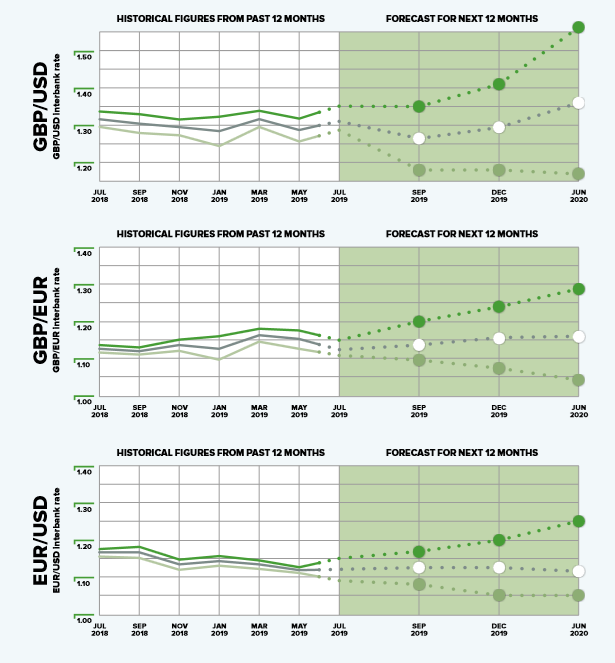The UK has a new PM, the Brexit deadline is inching ever closer, the US’s trade tensions with China and the EU continue and two unexpected nominations are confirmed for the European Commission and European Central Bank. It’s certainly a busy quarter – so what can we expect from the pound, and what does this mean for anyone buying abroad?
What happened in the last quarter?
As the Conservative leadership content got well underway, and narrowed down to Boris Johnson versus Jeremy Hunt, fears ramped up of a no-deal Brexit. Eventually, the two showed more similarities than differences in their approach: they both aim to renegotiate a new deal and hope to take the UK out by 31st October.
The US-China trade war is still continuing, despite a few temporary ‘truces’ and resumptions of talks. There has tended to be peaks of optimism, often dashed by either side refusing to compromise. Tariffs on the EU from America also raised their head, although have largely been put on the back burner.
Besides Brexit, the EU has been dealing with its own issues. The selection of the new President of the European Commission, Ursula von der Leyen, has proved controversial. As Defence Minister in Germany, she has been widely criticised for cuts to the Bundeswehr, as well being embroiled in a scandal over management of funds. Equally, the appointment of Christine Lagarde as sucessor to Mario Draghi at the ECB has also not been without criticism. Although she has vast experience as Managing Director of the IMF, she does not have direct central bank experience, and has made few public policy statements thus far. As France’s Finance Minister, she too was caught up in scandals, being found guilty by a French court of negligence over a deal signed with businessman Bernard Tapie.
The pound itself dropped to two-year lows, with the dubious distinction of being the worst-performing currency worldwide in the last year.
Where is the pound going?
We don’t know. Nobody does – not even the major banks. There are predictable factors that will impact the pound: we know Brexit will continue to push it around, for instance. What we can’t say definitively, and nobody can say with certainty, is that we’re completely sure of what will happen to the pound because of these risk factors. We also can’t predict everything that will impact it, especially when a single Tweet can set the markets moving. Just look at the disparity between the major banks’ forecasts below.

Between the pound and US dollar, the banks are predicting anything from 1.2000 (Barclays Bank) right up to 1.3500 in a year’s time (Morgan Stanley). For the euro, Deutsche Bank thinks it will dip down to 1.0753 – and Natixis thinks it’ll go all the way down to 1.0417. On the other hand, BNP Parabis is expecting it to hit 1.1765, and Informa Global thinks it will go all the way up to 1.2780.
The key message here? No-one’s forecasts are the same, so there’s no point trying to play the markets. Your chances of losing out are enormous.
If we list just a few more of the factors that will affect the GBP-EUR and GBP-USD rates, you can see how wide-ranging and varied the influences on the markets are:
Federal reserve: The big question is whether the Federal Reserve will cut interest rates this year. Trump is putting pressure on the Fed to cut rates, but Chair Jeremy Powell has so far pushed back, saying he won’t react to ‘short-term pressures’. However, Powell’s recent Congressional testimony adopted a different stance, pointing out the ‘broad’ economic weakness worldwide, raising expectations of an eventual rate cut after 31st July.
European public spending: With the slowdown of economic growth, it is believed by some that monetary policy can’t support the economy alone. European ministers have said that countries such as Germany and the Netherlands should increase public spending, in order to support the Eurozone. The Spanish Minister of the Economy also stated that, amid a favourable climate of low interest rates, better-off countries should help those who need to continue reducing their debt-to-GDP ratio.
Bank of England: There is growing expectation in an interest rate cut at some point over the next twelve months, as Mark Carney highlighted the ‘downside risks’ of global trade tensions for the UK economy, which is already contending with Brexit uncertainty. However, it could go any way, with Carney saying that no economic stimulus package is currently ‘guaranteed’.
US-China trade tensions: Xi Jinping and Donald Trump are both so far refusing to back down – and both sides insist that the deal must be better for them than the other. It makes the situation seem quite intractable, and means that it will continue to have an impact on the markets for quite some time to come. Thus far, whenever we’ve heard rumours of positive progress, it has all but come to nothing.
So what is the best strategy to take?
Rather than focusing on playing the risk, focus on completely removing the risk. As our Senior Trader Barney Cotton recently told us, our clients buying today who protected their money back in April are 5-6% better off than those who are just taking the chance and sending it today.
How? Because they’ve locked in their exchange rate with a forward contract. For no extra money, this guarantees you the same exchange rate for up to twelve months. So, when the markets suddenly drop, your money isn’t impacted, but you’ve already fixed your exchange rate. It takes just a few minutes to reap a year’s worth of benefits. Speak to your Personal Trader today on 020 7898 0541 to get started.





















